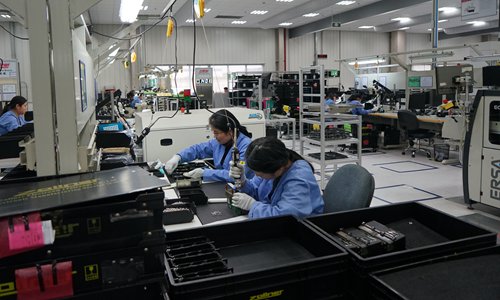
Employees work at the Zollner Electronic (Taicang) Co. Ltd, a world-leading mechatronics service provider in Taicang, East China's Jiangsu Province. (Photo: Qi Xijia/GT)
Taicang transformed itself by attracting German SMEs and adopting their unique vocational training
○ A growing number of foreign small- and medium-sized enterprises are setting up branches in Taicang's high-tech zone
○ High-end German corporations are especially attracted to Taicang's strict working standards
○ Local Chinese talents are being educated, trained and groomed in Taicang to work for foreign firms
Despite erroneous media reports about China's "worsening investment environment," a tiny Chinese city rarely heard of has been attracting overseas investment, becoming a new home to dozens of leading global enterprises.
Taicang, East China's Jiangsu Province, hosted the first Sino-German Hidden Champion Forum in November.
The city has become home to over 600 foreign firms. Among them, 46 are categorized as "Hidden Champions."
Hidden Champion refers to small- and medium-sized enterprises (SME) as well as family-owned businesses that have become world leaders in their respective fields despite their diminutive size. They are rarely known among the general public, as they focus more on providing parts and services for bigger, more renowned clients.
The worldwide market changes very fast, yet China is developing at an even faster pace, Matthias Müller, managing director of the German Centre for Industry and Trade Taicang, told the Global Times at his office in Taicang, one hour drive from downtown Shanghai.
"If German companies just stay in their headquarters in Germany and can't give quick responses or solutions to their overseas clients, they will very soon lose the market to their competitors," Müller said. "That's why more and more foreign companies are opening offices, factories and warehouses in China."
Like a family
For foreign companies, especially SMEs, major Chinese cities are no longer an ideal locale to develop a business, Müller explained. Instead, fourth-tier Chinese cities such as Taicang are developing a unique model and infrastructure that is attracting more and more foreign investment.
Take the German Center as an example. Müller said that, for the same size and standard, the cost of a similar unit in Shanghai would be about six times higher than what they pay in Taicang.
Geographic advantage is also one of Taicang's biggest perks, as it is less than 50 kilometers between downtown Shanghai to Taicang's high-tech zone. What's more, it is only 30 kilometers from Taicang to Anting Town of Shanghai's suburban Jiading district.
Anting Shanghai International Automobile City and Shanghai International Circuit are part of Shanghai's auto trade, research and development and manufacturing zone. Many foreign companies in Taicang are suppliers of companies in Anting.
Administrative support from the local government is another highlight. Müller described it as "very professional" and "helpful," saying Taicang officials and German Center have developed a mutually beneficial relationship. More than 280 companies presently operating in Taicang are from Germany.
Erik Breslein, general manager of China Manufacturing of Zollner Electronic (Taicang) Co. Ltd, a world-leading mechatronics service provider whose clients include Apple Inc and China Railway Corporation, said Taicang's reputation for proving good service to its foreign companies has in turn attracted even more Western businesses to the area.
"Local officials know the German style and the German attitude," Breslein told the Global Times. "We are very direct and straightforward in solving problems. The development zone also has German-speaking employees to support us."
"It's like a small family here," Breslein said.
Selecting rather than attracting
"From the very beginning, when a foreign company has the intention to start a business here, we'll dispatch a fixed colleague to follow the client. Thus, the communication is seamless and very smooth," Yu Yingzhu, director of Investment Promotion Bureau of Taicang High-tech Industrial Development Zone, confirmed.
"Our staff not only help with the business processes for foreigners, but also lend a hand when they need personal help, such as local medical service or their children's educational issues," Yu told the Global Times.
Yu said that, with two new high-speed railways starting operations in 2019, Taicang will become even better connected to Shanghai and other neighboring cities.
In fact, Taicang's popularity among foreign firms has grown so much in recent years that it has gotten to the point that local officials are now "selecting - rather than purely attracting - foreign investment," according to Yu.
Environmental protection is a vital factor when it comes to choosing which foreign investment Taicang will allow in. "If a company cannot meet our high environmental standards, we must refuse them, no matter how big their investment or how profitable their project," Yu told the Global Times.
Breslein explained that, for his company, "it's no big deal in the environment issue. We already have a high code of conduct, already have very high standards. We make sensitive electronics in our plants, so we are not impacted by that."
"German companies usually do quite well in this respect, even if some process of a certain company has pollution problems, they will curb and solve it," Yu said.


















































